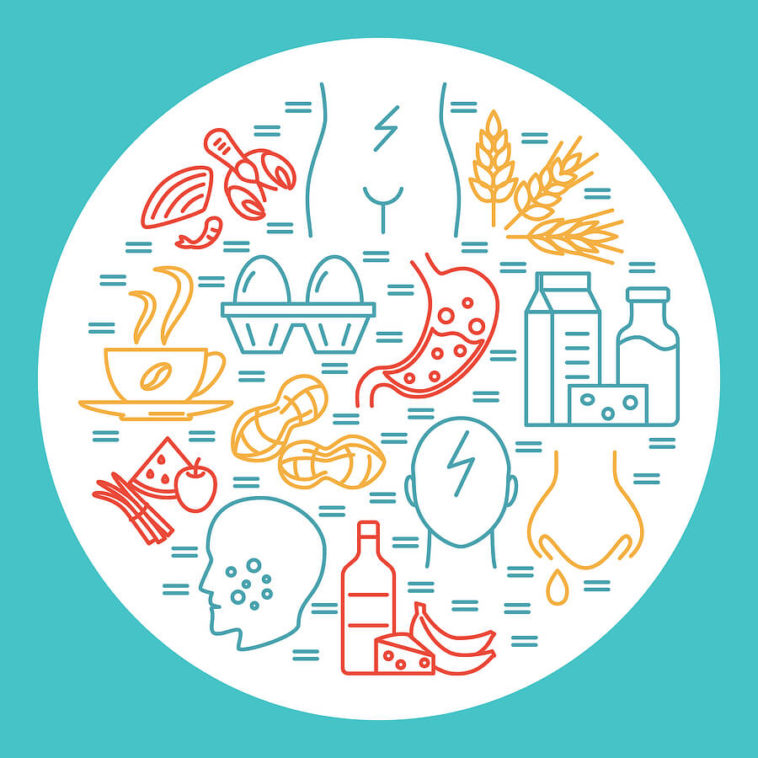If you suffer from food allergies or food intolerance, it can be confusing. Food allergies and food intolerances have significant differences – and knowing the difference could save your life. In this article we help you understand the difference between food allergies and food intolerance so you can make healthy choices.
The Difference Between Food Allergies and Food Intolerance
There's an essential difference between food allergies and food intolerance:
Food Allergy – Refers to the immune response your body has to certain foods such as cherries or strawberries.
For example, if you're allergic to these two fruits, then your body can have a serious reaction to them, and you may suffer from anaphylaxis.
A food intolerance can irritate your system, but it won't initiate an immune response.
Understand the Danger of Food Intolerances
Food allergies are generally more dangerous than food intolerances. Yet, medical experts recommend that you stop eating foods that irritate you or make you feel sick.
You may need to seek immediate medical help if you have an allergic reaction to a food. Yet you may be able to avoid a hospital visit if you only have a food intolerances.
Serious allergic reactions to food can be life threatening and need to be handled immediately.
If you suspect you may have a serious food allergy, it's important to discuss it with your doctor. You may need an EpiPen or other medication that can save your life in an emergency.
Be Mindful of Your Body
It's important to pay attention to your body after you eat something so you can note which foods are contributing to any uncomfortable reaction you feel.
Keeping A Food Journal
When you're trying to discover food sensitivities it's a wise idea to keep a food journal to record when you cut or add back foods and any symptoms you notice.
The benefit of keeping notes is to give you a better idea of what foods could be causing your uncomfortable symptoms. If you like to keep digital notes, then there are helpful apps like MyFitnessPal and other tools on food journaling.
Testing For Food Sensitivity
A Food Sensitivity Test along with a two-part elimination diet can be useful to help you identify problematic foods.
Before you start your two-part elimination diet, you can begin by taking a Food Sensitivity Test to get a personalized list of “suspect foods” based on IgG antibody reactivity levels. (IgG antibodies are part of your immune system)
The Two-Part Elimination Diet
Step 1: Eliminate Food Suspects
Part one of a two part elimination diet is when you temporarily remove specific foods that may be connected to the symptoms you're feeling, or foods you have a high or moderate reactivity to based on your Food Sensitivity Test results.
Step 2: Reintroduce Food Suspects
Part two comes after 30 days when you gradually reintroduce the “suspect foods” back into your diet.
The goal is to pinpoint the foods that are making you feel bad.
You may need to adjust your meals at home and be more aware of the ingredients in the food you eat away from home. You may need to cut some foods and substitute them for others.
Example Calendar of a Two-part Elimination Diet
Day 0
Review Food Sensitivity test results + make a plan for substitution foods
Day 1
Remove select food suspects from your diet.
Day 7
Check in with yourself.
How are you feeling?
Day 15
Reminder: You're half way there! Keep going!
Day 30
Add-back phase begins.
Add back food suspect 1
Day 30-34
Monitor symptoms:
Symptoms? Avoid this food
No symptoms? Add it back
Day 34
Add back food suspect 2
Day 34-38
Monitor symptoms:
Symptoms? Avoid this food
No symptoms? Add it back
Day 38
Make note of which foods you were able to reintroduce with no symptoms and which foods you have identified as food sensitivities.
Day 39
How are you feeling?
Understanding the Difficulty of Food Intolerances
A food intolerance can be more complex and difficult to understand.
Although your body doesn't have an immune response to an intolerance, you may still feel very sick. You may experience stomach issues, cramping, bloating, and other symptoms.
Lactose Intolerance
Lactose or gluten intolerance are examples of a food intolerance that isn't an allergy.
It's important to note that once you cut or stop eating the food that is causing the intolerance, then your symptoms go away.
Overlapping Symptoms
Food allergies and food intolerances can have overlapping symptoms. This complicates diagnosis and makes it more difficult to determine which one is happening in the body.
Overlapping symptoms can include stomach pain and other issues.
Possible Causes of Food Allergies and Intolerances
Scientists continue to research why and how food allergies and intolerances develop.
Genetics may play a role in food allergies and intolerances. If you have a family member who is allergic to soy or another food, then you may be at a higher risk of having a similar allergy.
Researchers have also found that the human body can lack certain enzymes that make it difficult to digest your food. This can also lead to a food intolerance.
Food Additives Can Create Intolerances
Food additives can also create intolerances because you may be sensitive to them. Packaged and processed foods have many chemicals in them that can lad to issues and intolerances. You may become sensitive to one or more chemical additives.
It's important to pay attention to the differences between food allergies and food intolerances. You may want to consult your health care provider about questions you may have related to food issues.
Don't forget to follow us on Pinterest. Thank you for your time and reading.


